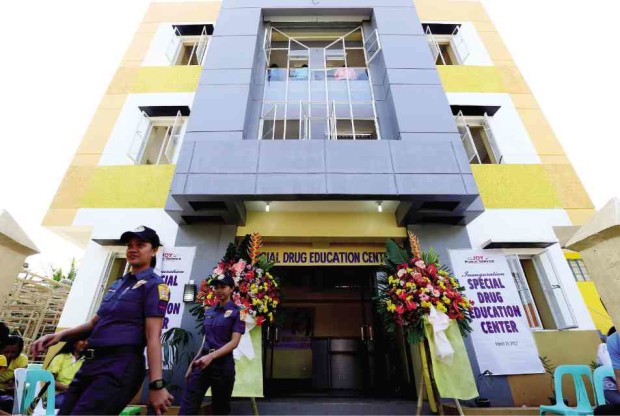QC antidrug centers focus on ‘kids at risk’

One of the four newly inaugurated Special Anti-illegal Drug Education Centers is on IBP Road, Barangay Batasan Hills.—EDWIN BACASMAS
Early intervention is key to addressing the drug problem, Quezon City officials said on Wednesday when they inaugurated four Special Anti-illegal Drugs Education Centers (SDECs) that would cater to out-of-school youth and street children who are deemed at risk of falling into drug addiction.
But unlike rehabilitation centers where patients stay for some six months of treatment, the SDECs are community-based facilities where children and youth can be brought in for at least three hours of sessions meant to help veer them away from substance abuse.
The sessions include counseling, learning sessions on the effects of substance abuse, skills training and livelihood services, nonformal education through the Alternative Learning System, as well as sports and cultural activities.
Created through Ordinance No. SP-2538 which was signed by Quezon City Mayor Herbert Bautista in December last year, the SDECs will be staffed by social workers and health professionals, including psychologists, who will determine what interventions are needed by vulnerable children identified by the barangay or volunteered to the facility by their parents.
Parents could be included in the sessions, especially if the child has been found to have been addicted to solvent use because of neglect and lack of guidance, said Vice Mayor Joy Belmonte, who will oversee the SDECs’ operation as head of the city’s anti-illegal drug abuse advisory council.
Article continues after this advertisementSolvent use
Article continues after this advertisementDrug addiction among the poor usually progresses from solvent use to “shabu” and marijuana, the vice mayor said. By intervening early on, the council hopes to halt the drug scourge on its tracks, she added.
Should health workers assess that stronger interventions are needed, Belmonte said that it would only be then that they would recommend the affected youth to a rehabilitation center.
They are also ready to link up parents to the city’s various Technical Education and Skills Development Authority (Tesda) programs should unemployment be seen as one reason why young people get addicted to solvent, the official said. The substance is often used to relieve hunger pangs.
Guidelines and protocols for the SDECs and the training of personnel who will run them are being finalized, Belmonte said, adding that the four facilities, located in Barangays Batasan Hills, Milagrosa, Greater Lagro and Tandang Sora, will be fully operational by April.
At least two more facilities are set to open in Barangays Mariana and Masambong before the end of the year, she added.
Each facility is estimated to cost around P12 million, with funds allotted by the office of former Speaker Feliciano Belmonte, Joy’s father and a former Quezon City mayor. The local government has meanwhile set aside P30 million for the upkeep of each center.
The vice mayor said that since 2013, officials had been pushing for the creation of child-processing centers in the city, but it was only last year when the initiative was finally rolled out.
Drug-free barangays
The initiative puts Quezon City at the forefront of the battle against illegal drugs. Just recently, the city declared 19 of its 142 barangays “drug-free.”
Its antidrugs campaign also led to the arrest of several high-profile drug users and peddlers, including former adult film actress Sabrina M (Karen Palasigui) and actress Krista Miller (Kristalyn Engle).
Mayor Bautista’s own brother, Councilor Hero Bautista, was also forced to take a leave after testing positive for illegal drug use.
The city has one of the metro’s highest number of drug surrenderers, with over 15,000 users and more than 1,400 peddlers turning themselves in to authorities since July 1. Police has also arrested more than 5,100 users and peddlers.
Despite its antidrug initiatives, the city has one of the highest number of persons killed in the drug war, with at least 305 persons illed by unknown assailants and 289 killed in police operations.